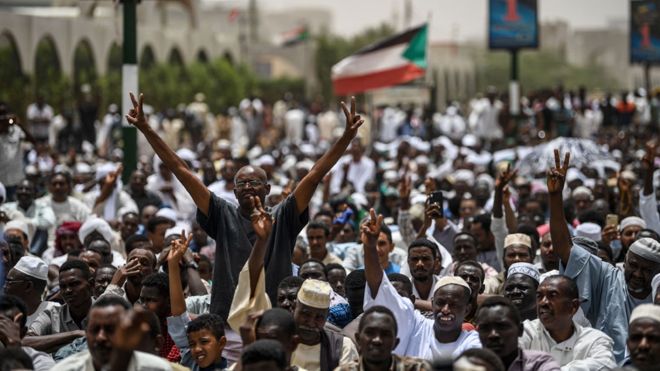The leaders of Sudan's protest movement say they will name members of a transitional authority on Sunday, to replace the current military junta.
Following months of protests, the army ousted long-standing leader Omar al-Bashir last week.
But the protesters want the military to hand power to a civilian authority.
To back up their demands, huge crowds once again gathered outside the military headquarters on Friday, chanting: "Freedom, peace and justice".
Thousand of people gathered in the centre of the capital, Khartoum, after Friday prayers in the biggest protests since Mr Bashir was forced from power, Reuters news agency reports.
The military has given in to several of the protesters' demands, including saying they can name a prime minister and transferring Mr Bashir to a maximum security prison.
However, it has refused to step aside and many Sudanese fear that the same elite of military officials and politicians is still in power behind the scenes.
"If we don't stay, it will be as if we hadn't done anything, we will stay until we oust the military council," 26-year-old protester Rania Ahmed told Reuters.
The Sudanese Professionals Association, which has been spearheading the protests, said it would name members of its transitional council at a news conference at 1700 GMT on Sunday outside the army base.
Read also:Â Sudan crisis: Ex-President Omar al-Bashir moved to prison
"We are demanding that this civilian council, which will have representatives of the army, replace the military council," Ahmed al-Rabia, a leader of the umbrella group of unions for doctors, engineers and teachers, told the AFP news agency.
Meanwhile, the United States says it is sending Makila James, the deputy assistant secretary of state who is in charge of eastern Africa to Khartoum over the weekend.
"The will of the Sudanese people is clear: it is time to move toward a transitional government that is inclusive and respectful of human rights and the rule of law," said State Department spokeswoman Morgan Ortagus.
The protests began four months ago, after subsidies for bread and fuel were cut, which led prices to shoot up.
But the unrest soon spiralled into demands that Mr Bashir, in power since a 1989 coup, step down.
Source: bbc





